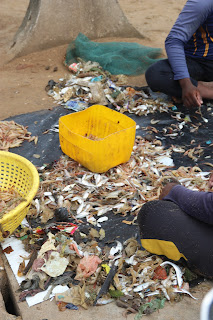Challenges and Community Efforts in Sustainable Trawl Fishing Operations in Negombo, Sri Lanka
Aruna Sampath M
Introduction Negombo, a coastal city in Sri Lanka, has a rich history of trawl fishing that primarily targets shrimp. Traditional sailboats have operated in this region for over a century, with two primary locations Porathota and Negombo City (back side of the Court) serving as the main operational hubs for these vessels. This article focuses on Porathota, where local fishers have formed the "Al Aksha Fishers Society" to support and advocate for the fishing community's needs.
A Legacy of Sailboats in Trawl Fishing
In Porathota, sailboats have been central to trawl fishing for generations.
Initially, these boats were made of wood, but modern demands and material
availability have led fishers to switch to fiberglass boats, which offer
enhanced durability and resilience in challenging sea conditions. Currently, 26
sailboats operate in Porathota, each crewed by approximately four fishers.
These vessels undertake trawl fishing expeditions lasting between 3 to 7 hours,
depending largely on wind patterns.
Each fishing trip involves several hauls typically 3
to 4 per trip based on wind and sea conditions. The fishing is conducted
year-round, with shrimp being the primary target species. However, fishers are
increasingly facing operational challenges, particularly related to
environmental pollution, which threatens both their productivity and the
sustainability of their fishing grounds.
Environmental Challenges and Their Impact
on Trawl Fishing A significant concern for the Porathota
fishers is the increasing accumulation of garbage on the seabed, which impacts
both the efficiency and quality of their fishing operations. Fishers report
that, on average, each trawl net hauls in approximately 2 to 5 kilograms of
waste alongside their intended catch. This waste includes a variety of
materials such as plastic shopping bags, yogurt cups, and even wooden debris,
which hampers the quality of the shrimp and damages the fishing nets.
The presence of this waste extends fishing times due
to the additional labor (Time) required
to clean the catch, decreases the quality of harvested shrimp, and contributes
to the degradation of the fishing bed, affecting the ecosystem. Fishers believe
that the government’s response to these issues has been insufficient, with
little support provided to address seabed and coastal waste management. This
pollution not only reduces fishing efficiency but also poses safety risks and
threatens the sustainability of marine life in the area.
The Role of Al Aksha Fishers Society and
Community Initiatives To counter these challenges, the
Porathota fishers established the Al Aksha Fishers Society, which seeks to
support the fishers and advocate for better conditions. The society emphasizes
the need for government intervention in managing waste collection both at sea
and along the coast. Additionally, fishers have expressed a need for safety
equipment, such as life jackets, which are essential for their protection from
the unpredictable sea.
In a proactive step towards environmental stewardship,
the fishers of Porathota have committed to collecting the waste that
accumulates in their nets and bringing it to the landing sites for proper
disposal. However, they stress that this effort requires formal support and a
structured waste management system from the government to ensure effective
disposal and recycling, thus minimizing environmental impact.
Conclusion and Recommendations
The traditional trawl fishing community of Negombo, particularly those using
sailboats in Porathota, faces mounting challenges due to pollution, limited
safety equipment, and insufficient government support. These issues highlight
the urgent need for collaboration between the fishers and government agencies and
other stockholders to ensure the sustainability of marine resources and the
livelihoods dependent on them.
Several recommendations emerge from this analysis:
- Enhanced
Waste Management: The government could implement a
waste collection and disposal program for coastal and seabed garbage,
which would benefit both the ecosystem and the fishing community.
- Provision
of Safety Equipment: Safety gear, including life
jackets and emergency kits, should be provided to fishers to promote safer
working conditions.
- Collaborative
Clean-Up Efforts: By establishing formal support for
community led garbage collection initiatives, the government can empower
fishers to take an active role in maintaining the cleanliness of their
fishing grounds.
Through a combination of government support, community
initiatives, and sustainable practices, the traditional trawl fishing
operations in Negombo can continue to thrive, preserving both marine life and
the economic well-being of the fishers.
Photos . Porathota lading site. Negombo














Comments
Post a Comment